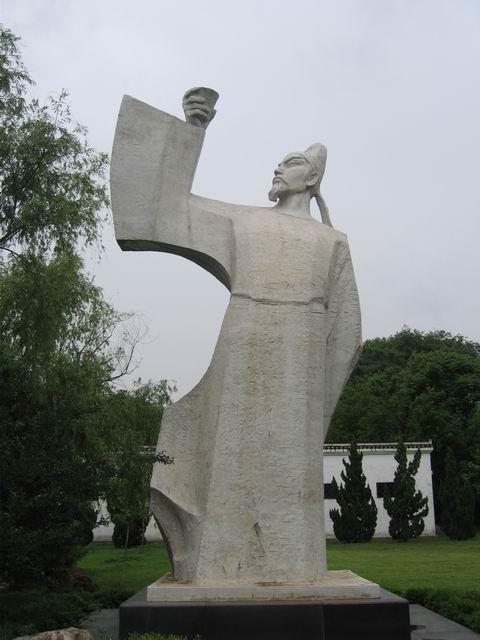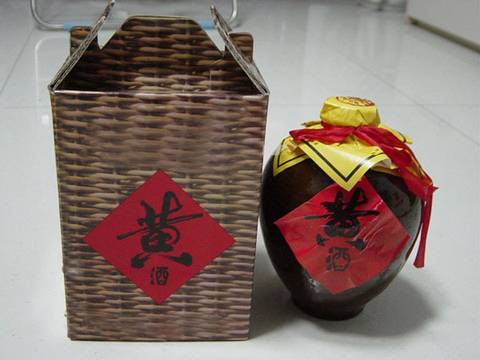 |
| Sculpture of Li Bai |
The image of a scholar raising a glass of wine to the moon features in many Chinese paintings. In ancient times alcohol was lauded as the fountain of inspiration for men of letters, and is credited for many immortal works by some of the greatest names in China’s history of literature, such as Li Bai and Li Qingzhao.
The character 酒 (jiǔ), alcohol, is composed of two parts, the left standing for water and the right, fermentation of grain.
The drink is served in a 酒碗 (jiǔ wǎn), bowl, 酒盅 (jiǔ zhōng) or 酒杯 (jiǔ bēi), both meaning cup.
There is a saying in China that a banquet is incomplete without liquor. And it is dining etiquette for the host to press the guest to “drink more” – and for the guest to oblige. There is presumably a good reason for this tradition: alcohol has the power to relax and dissolve inhibitions; Chinese people, by and large introverted, are prone to let their hair down after a few shots.
People often drink more when in the company of good friends, and they call this 酒逢知己千杯少 (jiǔ féng zhī jǐ qiān bēi shǎo), one thousand shots are not enough when drinking with a bosom friend. Liquor offered at a wedding banquet cannot be rejected, as it is 喜酒 (xǐ jiǔ), a drink of happiness.
People have varied 酒量 (jiǔ liàng), tolerance for alcohol. Some 能喝, (néng hē) are able to drink a lot, and some 不能喝, (bù néng hē) aren’t.
There is a whole set of established games to 劝酒 (quàn jiǔ), urge others to have another drink (and another). For instance, one may propose a glass be emptied in a certain number of sips, or give a brief 祝酒词 (zhù jiǔ cí), toast, prior to the clinks. 敬酒 (jìng jiǔ) is usually to propose a toast individually as a gesture of attention and respect, and is often requited by 回敬 (huí jìng), return of the toast.
A big drinker might demand others to 一口干 (yì kǒu gān), finish a glass in one go, or allow others to 随意喝 (suí yì hē), drink at will, and it is a gesture of kindness to say 我干你随意 (wǒ gān nǐ suí yì), I will down it in one shot, but you can drink as much as you like.
There is a good variety of indigenous alcoholic beverages in China, the most popular being 米酒 (mǐ jiǔ), rice wine, and 白酒 (bái jiǔ), distilled spirit. The former originated in the south and is, as the name suggests, made of rice. It is a sweetish drink of thickish consistency. 白酒 (bái jiǔ) is brewed with wheat and other grains, and loved all over the country.
 |
| Yellow wine |
黄酒 (huáng jiǔ), literally yellow wine, is a kind of rice wine, and 烧酒 (shāo jiǔ), fire water, is white liquor of high alcohol content. In traditional Chinese medicine, it is usual to find 药酒 (yào jiǔ), medicinal liquor, where herbs or berries and sometimes animals such as snakes or scorpions are soaked in alcohol and the resulting tincture administered. This type of medicinal beverage should not be taken without the doctor’s advice.
Excessive consumption of alcohol is harmful. People can become aggressive or abusive when inebriated, 发酒疯 (fā jiǔ fēng). They may also speak 酒话 (jiǔ huà) drunken words. There is a saying 酒后吐真言 (jiǔ hòu tǔ zhēn yán), drunk people speak the truth. But we all know in many cases this is nothing but senseless ramblings.
We recommend:
